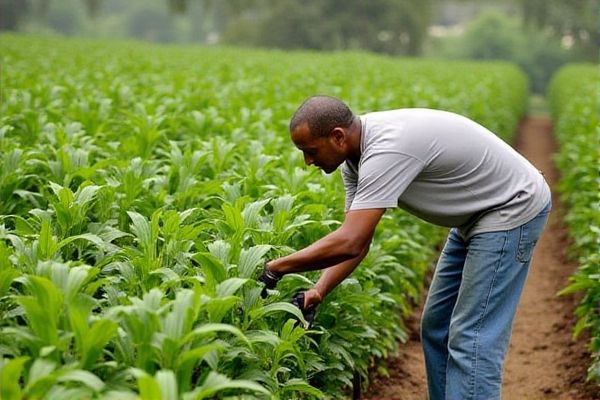
The horticulture sector in Kenya is rapidly growing, presenting numerous job opportunities across various areas such as production, research, and marketing. Positions range from farm managers and agronomists to quality control inspectors and exporters, catering to both local and international markets. The demand for skilled professionals in organic farming and sustainable practices continues to rise, emphasizing the importance of training and knowledge in modern horticultural techniques. Networking within industry associations and participating in agricultural fairs can significantly enhance job prospects and career development in this vibrant field.
Job Description
Horticulture jobs in Kenya involve a variety of roles centered around the cultivation and management of fruits, vegetables, and ornamental plants. Workers may engage in greenhouse management, pest control, and soil maintenance, focusing on sustainable practices to enhance yield and quality. Skills in agronomy, plant biology, and environmental science are essential for success in this sector, which is vital to Kenya's economy. Opportunities within this field can also offer insights into local agricultural practices and innovations, enabling you to contribute to food security and economic growth.
Requirement
Horticulture jobs in Kenya often require a minimum of a diploma or degree in horticultural science, agronomy, or related fields. Practical experience is highly valued, especially familiarity with local crops, pest management, and sustainable farming practices. Knowledge of modern agricultural technologies and proficiency in irrigation systems can enhance your employability. Strong communication and teamwork skills are essential in this collaborative industry, as many projects involve working closely with farmers and agricultural organizations.
Salary and Perks Expected
Horticulture jobs in Kenya offer a diverse range of salaries depending on factors such as experience, education, and location. Entry-level positions may earn between 20,000 to 40,000 Kenyan Shillings per month, while more experienced professionals can command salaries upwards of 100,000 Kenyan Shillings. In addition to competitive salaries, many horticulture positions provide perks such as opportunities for career advancement, health insurance, and bonuses based on performance. Engaging in the flourishing horticulture sector can lead to fulfilling career paths, given Kenya's rich agricultural landscape and growing global demand for fresh produce.
Similar Job Names
- Horticulture Technician
- Agricultural Horticulturist
- Greenhouse Manager
- Landscape Designer
- Nursery Manager
- Farm Manager
- Horticultural Research Scientist
- Post-Harvest Specialist
- Floral Designer
- Agronomist
- Plant Pathologist
- Irrigation Specialist
- Crop Production Manager
- Botany Researcher
- Garden Center Manager
- Landscape Architect
- Plant Breeder
- Horticultural Consultant
- Crop Nutritionist
- Urban Forester
Job Expectation Concept
Horticulture jobs in Kenya offer a vibrant array of opportunities, reflecting the country's rich agricultural landscape. Roles may include farm management, agronomy, and marketing, with many positions emphasizing sustainable practices to enhance productivity. You might find positions in both small-scale farms and large commercial enterprises, each contributing significantly to the economy and food security. Understanding regional climate variations and crop selection can greatly enhance success in this dynamic sector.
Career Advantage and Weakness
Horticulture jobs in Kenya offer a range of career advantages, including a growing demand for skilled workers in both local and export markets. The diverse climate and fertile land create ideal conditions for cultivating a variety of fruits, vegetables, and flowers, enhancing job opportunities in production and management. One notable weakness in this field is the vulnerability to climate change and fluctuating weather patterns, which can impact crop yields and job stability. You may find that developing resilience through innovative farming techniques or diversifying your skills can provide a competitive edge in this dynamic industry.
Important Thing Must Know
Horticulture jobs in Kenya offer diverse opportunities across various sectors such as commercial farming, research, and agribusiness. The country's rich biodiversity and favorable climate make it an ideal location for cultivating a wide range of fruits, vegetables, and flowers. Engaging in these roles allows you to contribute to sustainable agricultural practices, improving food security and local economies. Many horticulture positions also emphasize skills in pest management, crop rotation, and soil health management, which are crucial for enhancing productivity. Exploring horticulture careers can lead to rewarding experiences and personal growth in an essential industry for Kenya's development.
Alternative Career Options
Horticulture professionals in Kenya can explore a variety of alternative career options beyond traditional farming roles. Opportunities exist in agricultural research, where you can contribute to developing sustainable farming practices and crop improvements. Engaging in roles such as landscape design or garden consultancy allows for creative expression while promoting environmental sustainability. Furthermore, pursuing positions in agricultural education or extension services helps disseminate knowledge and best practices to local farmers, enhancing the overall horticulture ecosystem in Kenya.
Companies List
- Kenya Agricultural and Livestock Research Organization (KALRO)
- Kenya Plant Health Inspectorate Service (KEPHIS)
- Kenya Forestry Research Institute (KEFRI)
- Agricultural Development Corporation (ADC)
- Kenya Seed Company Ltd
- Syngenta East Africa
- East African Seed Company
- Bayer East Africa
- International Centre of Insect Physiology and Ecology (ICIPE)
- World Agroforestry Centre (ICRAF)
List of Ideal City
Nairobi stands out as a major hub for horticulture jobs in Kenya, boasting a range of opportunities in floriculture and vegetable production. Nakuru, known for its favorable climate, offers thriving conditions for various crops, attracting numerous agricultural enterprises. Kisii is another city renowned for its tea and banana production, providing a rich environment for horticulture professionals. Eldoret, located in the fertile Rift Valley, presents significant potential for those interested in export-oriented horticulture ventures.
 jobs-kenya.com
jobs-kenya.com